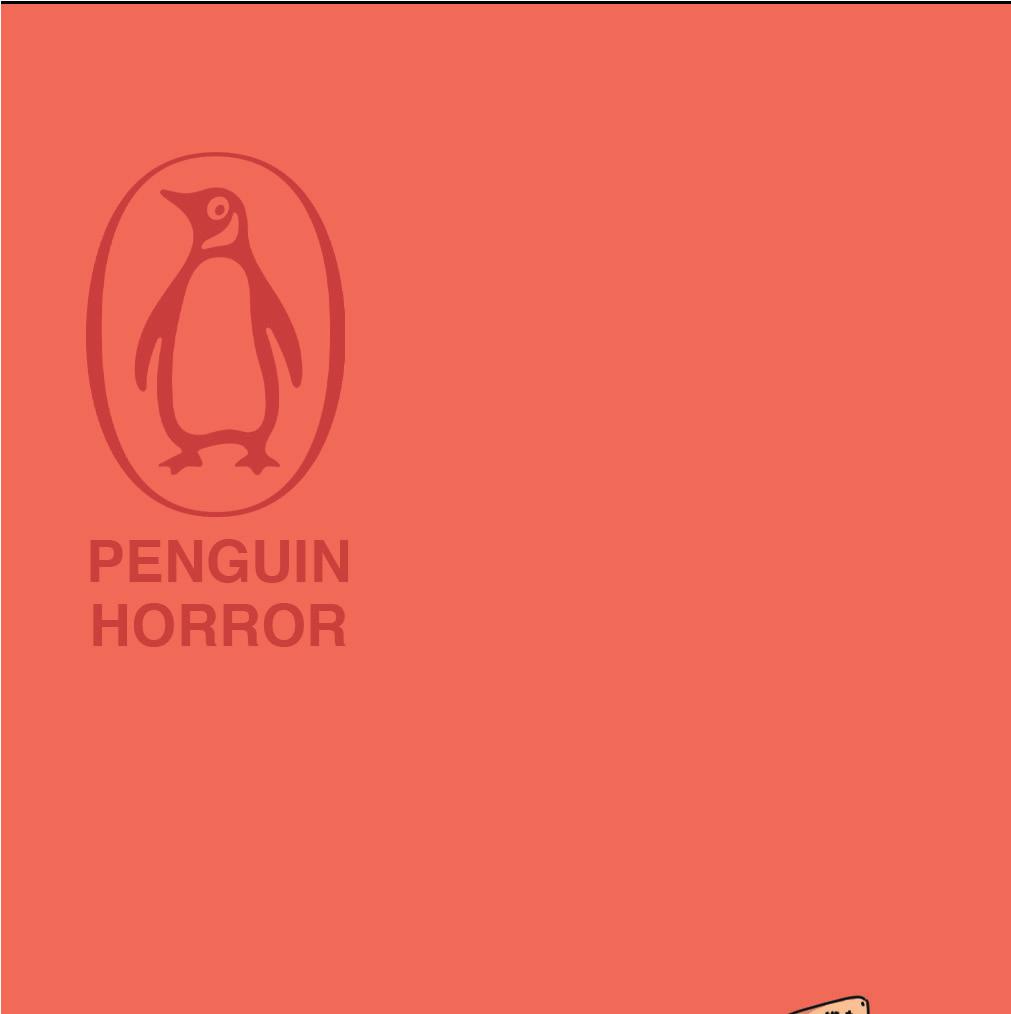
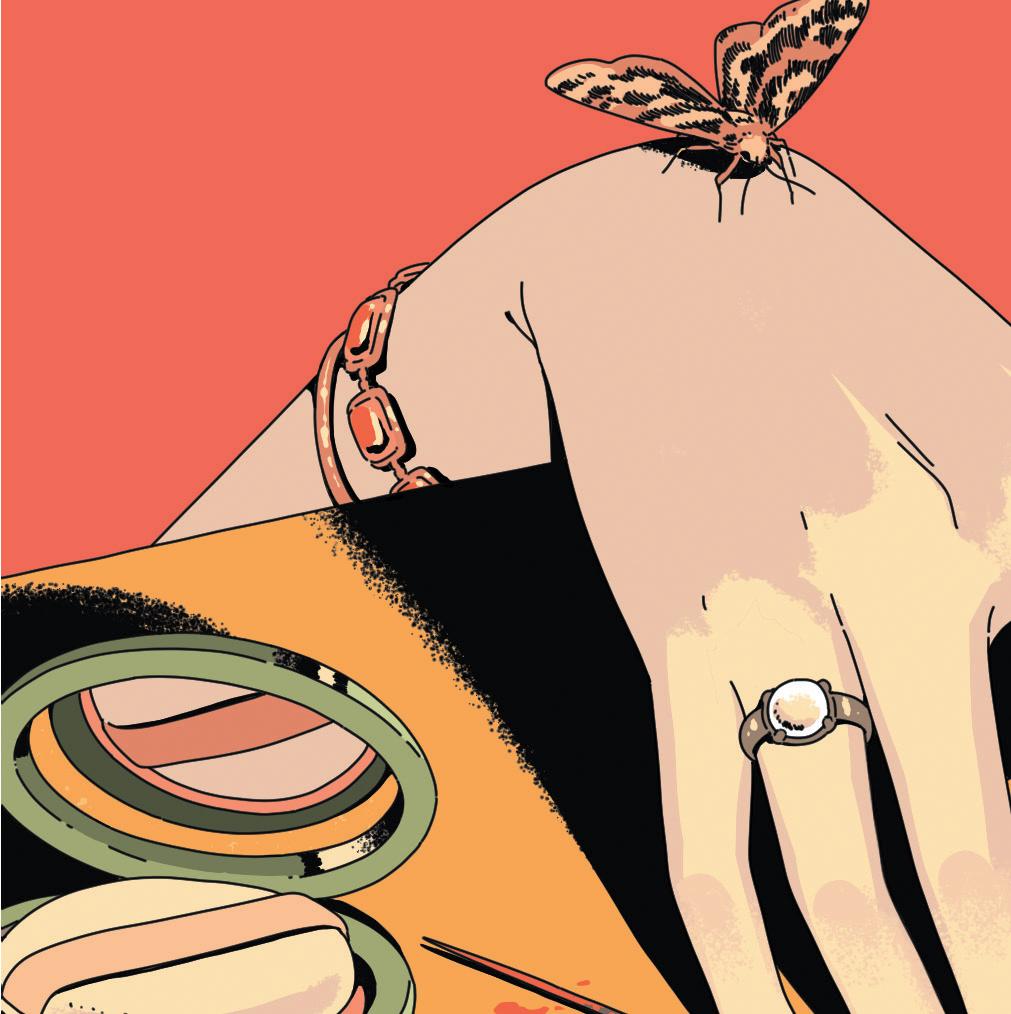
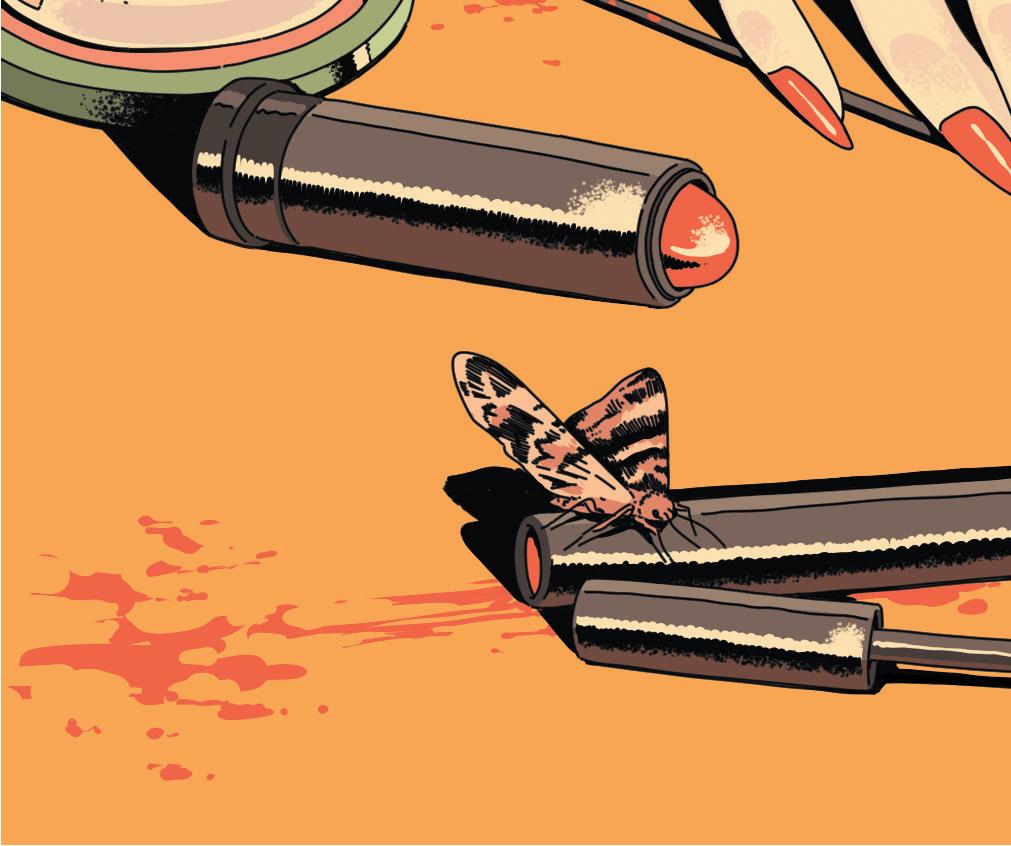
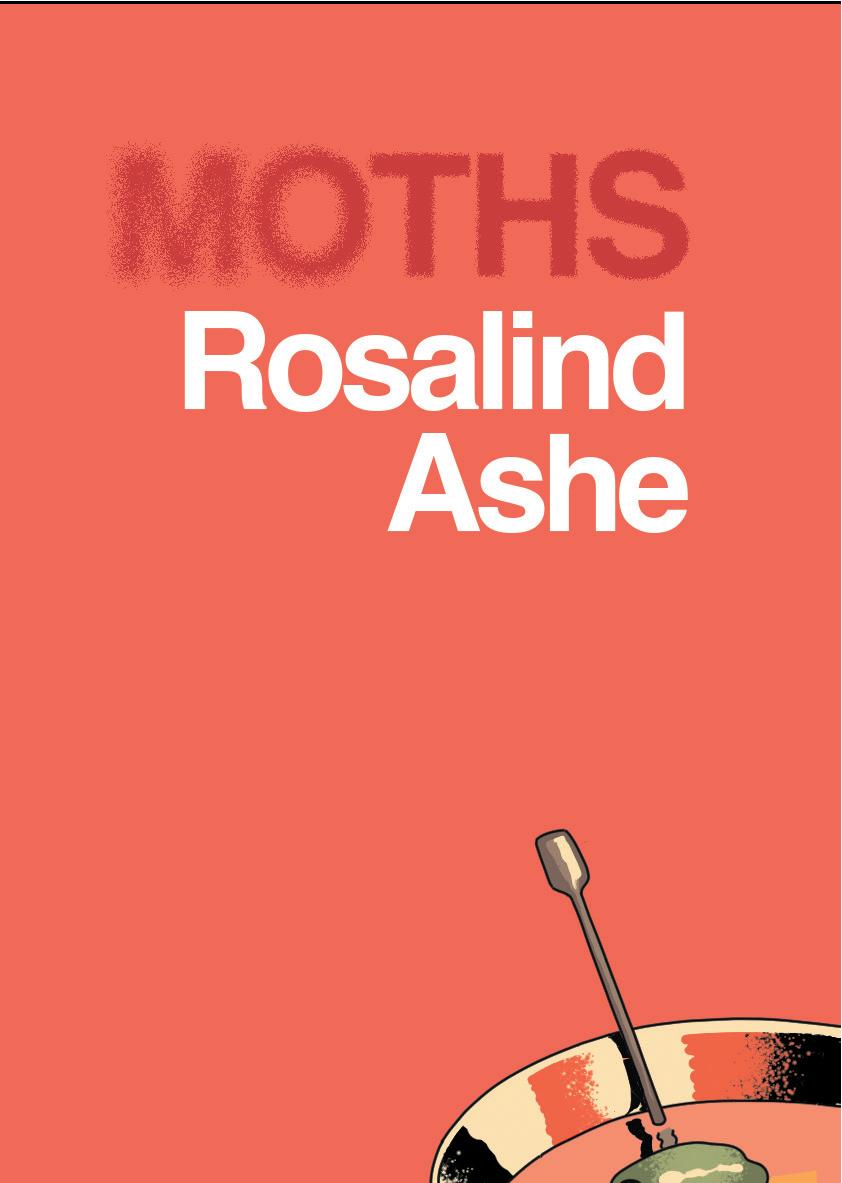
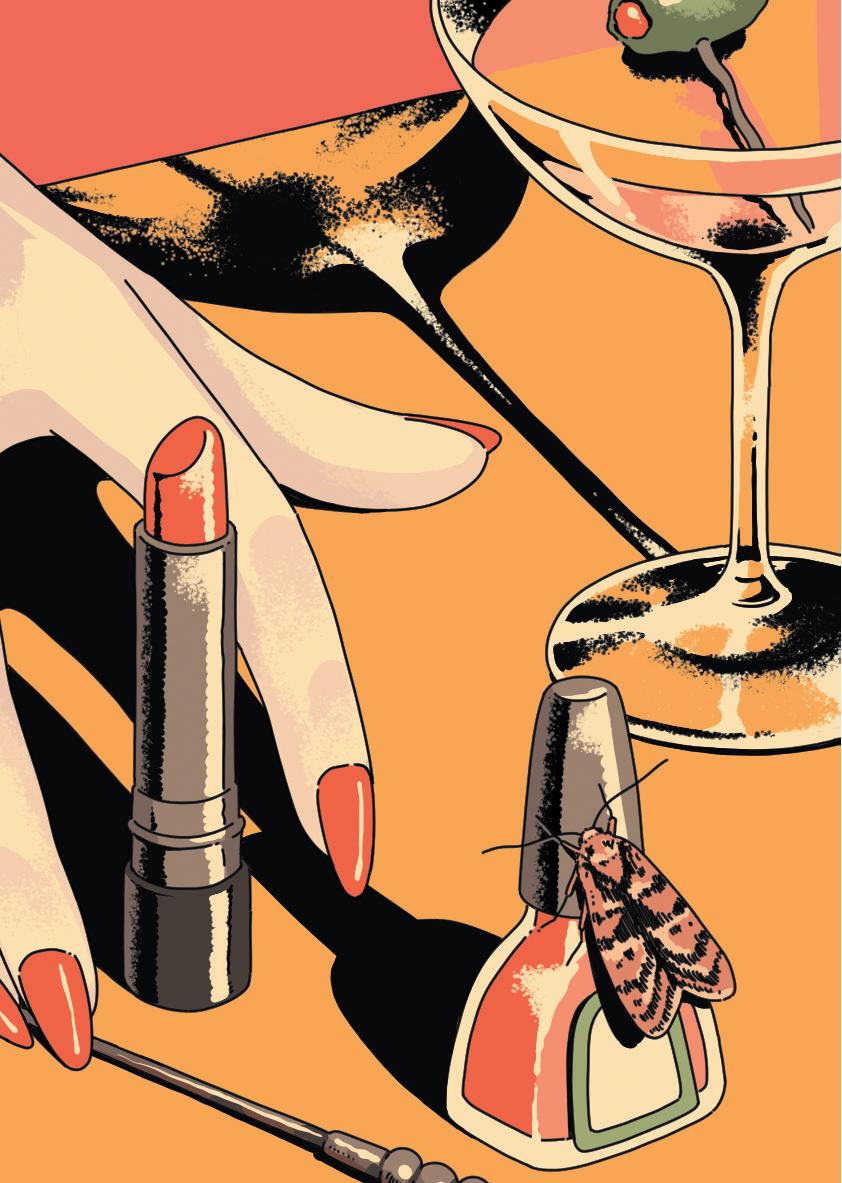
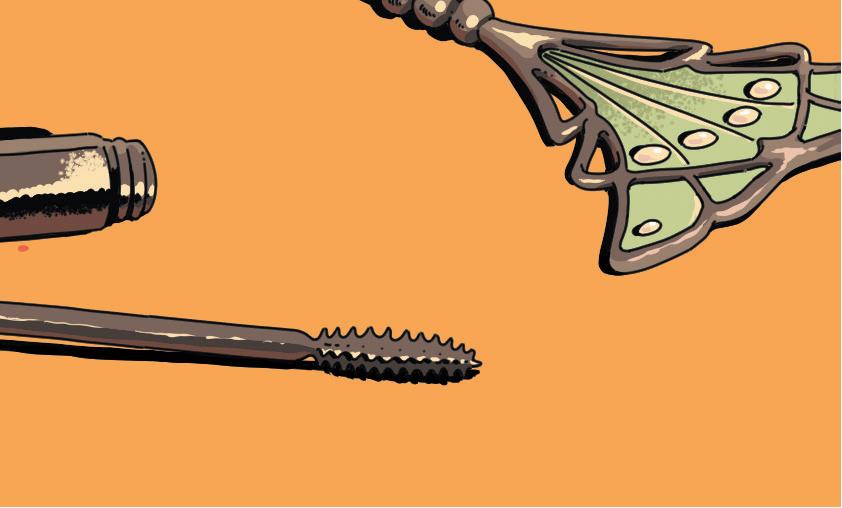







A celebration of the very best literary horror, a series of terrifying novels and tales that for generations have thrilled, captivated and kept readers wide awake at night.
PENGUIN BOOK S
UK | USA | Canada | Ireland | Australia
India | New Zealand | South Africa
Penguin Books is part of the Penguin Random House group of companies whose addresses can be found at global.penguinrandomhouse.com.
Penguin Random House UK , One Embassy Gardens, 8 Viaduct Gardens, London SW 11 7BW penguin.co.uk
First published in Great Britain by Hutchinson 1976
First published in the United States of America by Holt, Rinehart and Winston in 1976
This edition published by Penguin Books in 2025 001
Copyright © Rosalind Ashe, 1976
The moral right of the author has been asserted
Penguin Random House values and supports copyright. Copyright fuels creativity, encourages diverse voices, promotes freedom of expression and supports a vibrant culture. Thank you for purchasing an authorized edition of this book and for respecting intellectual property laws by not reproducing, scanning or distributing any part of it by any means without permission. You are supporting authors and enabling Penguin Random House to continue to publish books for everyone. No part of this book may be used or reproduced in any manner for the purpose of training artificial intelligence technologies or systems. In accordance with Article 4(3) of the DSM Directive 2019/790, Penguin Random House expressly reserves this work from the text and data mining exception
Set in 11/13 pt Dante MT Std Typeset by Six Red Marbles UK , Thetford, Norfolk
Printed and bound in Great Britain by Clays Ltd, Elcograf S.p.A.
The authorized representative in the EEA is Penguin Random House Ireland, Morrison Chambers, 32 Nassau Street, Dublin D02 YH68
A CIP catalogue record for this book is available from the British Library
ISBN: 978–1–405–98597–0
Penguin Random House is committed to a sustainable future for our business, our readers and our planet. This book is made from Forest Stewardship Council® certified paper.
I could not stand the immolation of the copper beech: the sun is caught behind it and now the whole western sky is flaming with ragged crimson cloud, fragments of the monstrous bonfire. I closed the tall shutters against the glare, but still it trickles through the cracks and bloodies the mahogany.
This table, I suppose, was too big to go in the sale; like the cupboard upstairs, a beached whale in the centre of the bare master bedroom looking out across the Thames. And that cupboard was there when they bought the house: it has survived two auctions. They called it Moby Dick, and Nemo took it over. It is a poor deal thing, now one can see its back; its ridiculous crown of wooden bobbles can’t fool anyone. Inside, it smells of her clothes and the musky Indian oils she got from small boutiques – where she probably bought the luscious poster of Che Guevara that James refused to have up in the bedroom. Now it is the sole occupant, curled and yellow in a drawer. Che lives.
Along with the fixtures and fittings – the extravagantly custombuilt, aggressively masculine, walk-in cupboard that James had the builders construct for him, the deep white carpeting indented by departed furniture, the honeysuckle-tiled fireplace. You can’t take it with you.
Someone took the bulbs, however. The chandelier above the stair-well is naked, and the ones I have bought with my provisions won’t fit the tiny sockets. The handrail snakes down the graceful curve into the dark, a beckoning fading gesture. But I had rather face the passage between the bedrooms, even the twisting back
stairs, than the hall with its padlocked drawing-room door. They had to do that: there were so many sightseers with no real interest in the sale. Serious buyers were given a look inside.
But I have put a bulb in the kitchen which I have made my base. It was always the centre of the house, dominated by the black Aga, the heart – pumping out heat and food, and absorbing all the rubbish patiently into its central ring. James was intending to convert it to oil, but he left it too late. Now it is cold and grimy. I found some fossilized croissants in the back of it, relics of enlightened European man.
Those would have been for Sunday breakfast, with fresh orange juice, elaborate coffee, the News of the World and the Mirror as well as the usual solid Sundays – James insisted on balance, the ‘tasties’ as well as the ‘tasteful’. All this in the ‘Large light modern kitchen with polished stone floor and ample working surfaces; facing S and W. Eating area with open grate and breakfast bench. Aga and calor gas. The conversion has carefully preserved the original brick arches and pine shutters.’
Dark bare stifling kitchen, smelling of fly-killer – one has survived to do a dance of death behind the shutters. I must suffer its interminable sizzling: letting it out would let in the vision of the burning copper beech. Perhaps it was foolish of me to return.
But the time to retreat in an orderly manner has come and gone. I would be looking over my shoulder to see something I did not want to see. I would give myself away by my fumbling haste with the ignition. If I got as far as the holly tunnel and the distant white gate, would I come out on the other side?
Subdue hysterical thoughts. I must not let the beech’s fire nest in my flax. I came back to the house I loved to have it to myself again. I found it first, before even Nemo and James, and together we disturbed the sleeping beauty. But I find myself attending a lonely wake.
Completing the full circle, perhaps I hoped to circumscribe the year’s events with a magic ring – insulate them and render them
harmless. Then I would pin them on the page, exotic moths. But of course you can’t get back to the beginning: the centre has shifted, the circle does not meet, and now the things inside are flowing, pressing through the narrow gap, swarming, thickening the air, clinging, cloying, unbreathable.
Outside the kitchen door the weedy gravel curve is a darkening well, the tall L of the house cutting off the western glow. The yellow rose in the centre is almost over, but the pool of fallen petals holds the light as pale flowers mysteriously do, even when dark has come. How quickly the garden has submerged enlightened man’s brief energetic rule. Wild peas have pulled down the ranks of white tobacco flowers I helped prick out in April: I can see them glimmering in the border at ground level; and bindweed has woven a cocoon round Nemo’s prized Rosa Mundi. Sharp unsettled cries of settling birds come from the wood, and the warm air is stagnant and curdled; the weather is on the turn. Rusted bars of cloud have closed in over half the sky.
Nemo’s mother was a blue-stocking manqué and christened her Mnemosyne, after the Greek muse of memory, and so as to recapture, perhaps, the honeymoon on which she was conceived. But everyone shortened it to Nemo, so she ended up as Latin instead, the Latin for ‘no one’. James called her Mo, but that had an aura of Wimbledon and frilly knickers, and I thought the Latin for ‘no one’ was better. At least it was wide open to other meanings: and I am not the first to find such haunting negatives full of vague suggestion. She dwelt among the untrodden ways, one felt; quoth the raven nevermore. Good reverberative stuff – intriguing, to put it at its lowest.
She was dark and fey and in her early thirties when I met her, when I met them, her and James, looking round the house. Unlike me, they were prospective buyers: they had collected the keys from the agents; and I – and an anonymous carload of sightseers with children – took the chance to see inside the house while we could.
She was unremarkable, I suppose; rather untidy, in dark glasses and faded trousers. I was so intent on the business of entering and opening up the house I already knew so well from the outside that I barely noticed her then.
We trooped through the hall and made straight for the ‘receps’ so highly recommended on posters and in the particulars. The big bell-shaped drawing room was in darkness, pierced by white light slanting through the cracks in the shutters, that muddied into slices of bright dust as we moved through them. James and I worked at the catches and forced them open, and
the folding leaves clattered back into their niches. Then another, then another, round the great bow.
Blinded by the incoming light, I turned to see the room we had woken. Almost a third of the wall space was absorbed by those soaring casements. The proportions were immaculate; there were fine mouldings and an austere marble fireplace. Uncluttered, a bowl of light, the room was as noble and bare and beautiful as I had known it would be.
‘I won’t spoil its bareness,’ she said.
So then I looked at her. She was standing in the dusty sunbeams staring up at the pure curve, her sunglasses in her hand, and her eyes were golden – coruscating with swarming specks of light like the small rare beetles that gild the corpse of an Amazon explorer. I knew very well that in shadow, and on her passport, her eyes would be ‘brown’: a poor two-dimensional sort of word, applied indiscriminately to those dead beads set into some faces like pairs of currants, as well as to those peat streams floored with mica pebbles, and dark Jamaican rum filled up with crushed ice, and the zircons, and chips of iron pyrites – aptly named ‘fool’s gold’ – that spin through my mind in the suspended second, as if I were a drowning man.
I suppose I fell in love – became obsessed, anyway. I date it from then. All at once, frightened by the impact, of her voice echoing my thoughts, her eyes making a troubled hive of my brain, I left them. I went to discover my house and to be alone.
That, in brief, was our initial encounter; and it would be unfair to myself and to the truth – the reason for writing this – if I did not admit I was in a vulnerable frame of mind. One obsession breeds another and I was already fanatically involved in the place itself; for finding it had been just such another blinding encounter, and in the space of about ten days had developed into a passion.
The Dower House at Sutton Hamden had been widely advertised. Large posters, bearing a medium-sized, medium-grey photograph
and a lot of information, had been up on several hoardings in Oxford – outshone by, but outliving, the week’s gaudy films. ‘This unique Georgian residence . . four recep . . six bed . . scope for modernization and renovation . . . Walled garden with serpentine feature, orchard, wood; seven acres in all . . .’
The grey photograph was effective, haunting by virtue of its very faults. It tugged at the eye like the smudged portrait in a newspaper that one senses immediately is a blow-up from a school group or family album, and that spells, without the aid of a caption, ‘No other available picture’ or ‘Missing, presumed dead’. Flat and uncontrived, hastily – even furtively – taken, in a poor light, the poster showed little more than a Georgian bow front, a blasted acacia tree, curved steps disappearing into long grass. Noble and forlorn, good lines, sad eyes. I had noticed it many times: it was to be auctioned in July.
I wanted no house. My rooms in College were extremely comfortable: by the time they reach forty, bachelor dons have usually feathered a snug nest, part of the vicious circle that keeps them bachelors. But driving back from London through Sutton Hamden one warm evening in June, I passed the poster again, this time surmounted by a large red arrow. It took me several minutes to turn in the lay-by, get back across the rush-hour stream and into the lane, by which time I was cursing my curiosity and thirsting for my cool rooms and a drink.
The Dower House was posted again at the fork in the lane, which narrowed, pressed in on by bolsters of cow parsley. Soon it degenerated into a pitted track, and disappeared at last under a tunnel of holly that scratched along the car roof and made me duck involuntarily. All I could see ahead was a section of pink brick and a mess of yellow roses.
I emerged into the sun, and the secret garden opened up to me, curving away on either side and closing its arms again around the old house. There were noble ancient trees that kept their distance – acacia, tulip, cedar – and then an inner ring where the L of the house
was continued by overgrown box hedge. This in turn had as its centre a wide circle of grass in the gravelled drive, and a straggling rose tree shed its petals into the bowl of a broken fountain. All this before the gravel was silent and the car door slammed; then, after the traffic and din, the astonishing quiet as I stood and gazed round, and gradually became aware of the sounds of the wood below.
They drew me along a path that led between the tall Georgian wing and the strangled herbaceous border, all willow herb and wild sweet peas, out on to the west lawn. There was the bow front of the poster – not grey but faded golden plaster that seemed to gather in the sunlight and hold it like honeycomb. Beyond, the Thames, improbably blue, wound through the view and disappeared behind high hollies and beeches in the steep wood, where a dense undergrowth of laurels and rhododendrons clothed the slope and lapped the edges of what had been a lawn.
Columbines sprouted and flowered between the steps, and I sat on the hot stone and leaned back against the curve of the house. I could make out a pair of double-sculls, delicate water-boatmen shapes, scratching the surface of the far-off river, and caught the metallic bark of an invisible coach distorted by the loud-hailer. Louder and nearer was the purr of wood pigeons, almost continuous, and now and then a woodpecker’s brief Morse, and the off-key June call of a cuckoo, quite close at hand.
I felt no impulse to explore further. This was no fumbling hasty flirtation. This was love, and however short the affair must be, I would draw out every moment of it. For this place was mine until the auction. There would be time to find out the hidden places of the garden and the wood, the orchard and the serpentine wall. Now I simply wanted to bask in the sun and my new passion, to plight my troth.
I remembered a case of white wine in the boot of the car, and fetched a bottle, which I took back to the steps. I opened it with my gadgety penknife and tilted it to my mouth. It was too warm,
but it was like supping liquid sun, looking up the barrel of the bottle and watching the bubbles break through.
Gradually the shadows lengthened across the grass, chilling the shaggy stones: I corked my bottle and rose. Now pheasants were churring domestically down in the spreading beeches, and the cuckoo had closed in, haunting me from the top of the tulip tree. The broad border was still in sunlight, and over it a cloud of insects simmered like a heat haze. I unwound a sprig of lavender from its swag of bindweed and put it in my buttonhole. Stopping to look at the two wings of the house – the grey-gold Georgian stucco, its pompous porch flaking under the damp load of honeysuckle, and the older kitchen block of humble brick – I was struck by its dual nature. It would be an expansive versatile house, I felt; and I was moved both by the neglected beauty of the place and by its potential as a way of life, a self-sufficient paradise I would never want to leave.
I travel light, even counting the hoarded treasures and comforts of my college rooms. No ties – frei aber einsam. I never get involved; but I decided to indulge in a brief affair with this secret place. Tomorrow I would return, as soon as the morning’s teaching was over, with work and a picnic.
I drove away slowly down the gravelled track, watching the pink brick and the yellow roses growing smaller in the mirror. Then I was enclosed in the dark holly tunnel and found myself outside in the lane, like Alice, full of wonder and disbelief.
There was very little about the Dower House in the Victoria County History to add to the passing references of the handbook on the Great House nearby. Mention was made of the ‘crinkle-crankle wall’ and of the ‘oval room’ – the bow-ended drawing room, presumably, looking out over the Thames. But one might hazard a guess that the wood below the house was the furthest extremity, perhaps the Wildernesse itself, of Capability Brown’s grand garden scheme. The wild west lawn was a platform that fell away with dramatic steepness unnatural to that part of Oxfordshire, forming a self-conscious vantage point as marked in Michelin guides, and the oldest trees, cedar and acacia, were set to frame a water-colourist’s view up the Hamden reach to the fabled spires.
I found, however, references to famous visitors who had mentioned or stayed at the Dower House: Oliver Goldsmith, Boswell, the actress Sarah Moore; and there was an allusion to a fire, the occasion for some rebuilding. My house, as I now thought of it, was interesting enough, mysterious enough, to justify my interest, if not my passion. That, I determined, should be deliciously unreasonable.
In England, hot clear weather is most likely to be the euphoria of fever – unhealthy flush, overbright eye – that precedes the spasm, the storm. Day after day of sun is something we are unprepared for, like all extremes in a sensible moderate-minded country: ‘set fair’ is a term the English use cautiously, and do not really understand. But the sun that flowed down my tilted wine-bottle when I plighted my troth to my house, and had built up in the stone I
sat on like a storage heater, was in its third day, and continued for three miraculous weeks. Water, and the choice in iced lollies, ran short; baths in College were rationed. Undergraduate plays in College gardens lost their premiums on rain-insurance but played to full houses through the warm midgey evenings. At Commem Balls the expensive striped tents were abandoned: both groups and dancers performed tieless and shoeless on the immemorial lawns.
Most of the exams were over: only a few of the more obscure sciences still drew in their clutch of students perspiring in subfusc, and through the open windows of the Examination Schools filtered the cries of the free, hailing one another from open cars and bicycles on matters of tennis, of punts, of strawberries.
I still had two-thirds of my normal tutorials to keep me in College. I was forced to decree that the academic gown should not be worn over the bare male torso; and I found it hard to expand in depth and with full concentration on the longer poems of Milton to the girls I was paid to instruct, as they lay back against my cool leather chairs in bright wisps of clothing over which the obligatory fustian was little more than a couple of titillating black straps. I switched to Marvell and Herrick: consistency, if not high seriousness, lay in their ‘sweet disorder in the dress’ and ‘green thought in a green shade’.
Each day as soon as I had dispatched my duties I escaped to the old house at Sutton Hamden, stopping only to get pâté or salami from the delicatessen in the covered market: I even bought an insulated plastic picnic bag to keep it cool, along with the butter and bottle of beer. I took a folding wicker bed-table acquired long ago in an auction because it was pretty. I had never found a use for it; but now I set it across my knees as I sat on the south steps, and spread out my books and goodies. The sun arced over and sloped down the western sky, and I moved to the broader columbine-fringed stones that overlooked the Thames.
As I got to know the garden, my desire to explore the house itself increased; but it was an ultimate, a crowning goal, and I
enjoyed a constant state of expectation suitable to a man in love. I knew that one day, perhaps tomorrow, I would walk in and open the shutters and watch it waken, and it would be all mine. But on the severely practical level it was a matter of monopolizing the keys for a day – and I was assured by the agent that they were in increasing demand as the auction drew nearer – or being on the spot when serious buyers arrived with the keys and ingratiating my way in. This was not the scenario I had planned, and twice I turned away the chance.
Once I returned from a walk down to the river and found the front door open; but the lilac E-type parked before it, and the sallow toddler that stood scratching with a nail-file at the crumbling stucco, made me head for my car and back to College. Another time as I sat eating my salami on the south steps, two large cars arrived, and a well set-up middle-aged couple, with the agent, did the usual round. The agent nodded pleasantly at me as they passed. I heard the rich booming voices of the solid prospective buyers condemning the old brick wing – ‘That of course will have to come down’ – and the agent’s smooth agreeing murmur. I was so incensed, even alarmed, that I nearly bit through the neck of my beer-bottle; all at once they were monstrous. As they passed back, red-faced blue-haired aliens, I heard them talking in a strange tongue of four-car garages, and a shooting syndicate – to cope with the pheasants in the wood. Then I heard them unlocking the front door. I could not bear it – I gathered up my books, my unfinished picnic and fled. I did not go back for three days – thinking it preferable to kill my love than witness something worse than death.
But of course I returned. I told myself I had always known it was a doomed passion – mine for such a little while: it was contrary to all the rules laid down for those who love and move on, to agonize over who should have it afterwards. Sitting at my desk in College, or even working in a deck chair in the formal garden, littered with tanning bodies, I knew just how far the
shadow of the tulip tree would have reached across the shaggy lawn, and how the crushed wild camomile would give out its sweet-and-sour scent now the sun had touched the western side. I went back.
By this time I knew the garden well. I knew the border was full of promise under the wild sweet peas and white nettles; and I had waded through the deep orchard grass and found a pair of old beehives and a small chicken run on the far side.
The walled acre itself was virtually impenetrable. Here the sun and the high sides had acted like a pressure cooker. Above a kitchen garden gone mad, giant cow-parsley towered with spreading umbrella flower-heads of extraterrestrial proportions. Gooseberries, loganberries, artichokes, rhubarb were there, glimpsed or guessed at, but all as safe as Princess Aurora, guarded by the all-encompassing brambles – and, no doubt, the basking adder. It was real adder weather.
The wood was another world. By this time the house had been empty more than a year, and untended for many more: the Wildernesse had been neglected so long that a genuine wildness was returning to it. Man must have planted those oppressive evergreens and laid out the winding paths that threaded them; but they had flourished monstrously, outgrown their strength, fallen, taken hold and grown again, fighting upwards to the light. Down here you could still make your way through. For under the gloom of laurel and rhododendron no weed took root; only a few pale ferns sprouted in the black leaf-mould. The winding tunnels were low, and blocked in many places by huge tree-trunks, spongy with age – almost mould themselves – richly matted with acid green moss and shelved with scarlet fungus. And always there was the sweet carrion smell of Dead Men’s Fingers, growing somewhere deep in the laurel thickets. It was, I suppose, an ecologist’s paradise of its kind, where the diversity of life-forms worked away like a restless yeast at every level in the steamy shade.
There was something, even then, that was vaguely threatening
about the wood: you felt, like Grandmother’s Footsteps, it might be a little closer when you turned round again. So, though I explored the Wildernesse, I preferred the upper garden and its level distances, the fragile plume of the tulip tree, the long walk with its wavy wall and arching sprays of ancient scented roses, even the prodigal walled garden. And it was all mine, just for a while.
Then came the time when, late one afternoon, two cars drove ahead of me up the lane into the holly tunnel and parked round the gravel circle. The Boyces had the keys, the other car was just a coincidence of sightseers; and then there was me, jealously guarding my domain. But this time I did not look too closely at the invaders. This time I was determined to break into my house.
So we opened the shutters, and saw the bare beauty of the rooms, and the woman spoke, and I looked at her eyes for too long. I fled from the drawing room, got well away from them to the old wing and found myself in the farthest corner of the L, where the small unshuttered cottage windows looked out over the northern valley.
Not since I was seventeen had I suffered such a coup de foudre. Here I was at forty, secure enough, rich enough, neither to toil nor to spin too arduously where need for female society was concerned, here I was tangling eyes with a woman, middleaged – well, thirty-five, perhaps – married, who had barged into my sacred preserves with her hairy husband and spoke as if she already owned the place. And this was no stranger on a train: the chances of my seeing them again were manifold.
For the sake of the house I would worm my way into their shortest list of favourite people. Fresh views opened up: I would not have to relinquish my paradise. I would see it in all its seasons, being coaxed into order. The fine old trees would spring from closely mown lawns, the deadwood disappear from the thickets, the pruned espaliers bear fruit once more. The big kitchen, I thought, as I pressed back the stiff brown-painted shutters,
would be bright and warm and she would move about it in a Liberty-print apron making sense of it all. But I seemed to have lost my thread of concentration. She was now impossibly mixed up with the house; and I realized with sickening certainty that I was going to fall in love.
I went from room to room, opening the doors and peering in unseeing, until I came back into the ‘grand’ wing, five steps up to accommodate the higher ceilings. I could hear voices and footsteps downstairs, and children in the garden. I did not look into the master suite – already it was Theirs; but I found a shuttered bedroom on the west side that felt still undiscovered. As I closed the door behind me against the sounds of intruders, a car drove away and for a moment I feared, and pretended to hope, it had been the woman and her husband. Then I tried to forget they existed, tried to recall the anticipated excitement of breaking into my house. Surely this was enough to quicken my pulse and make my knees weak at the tum of the stair. Now, all powerful and all intent, I would open the view I had never seen, the full upstairs view of the west.
The catch was both ingenious and stubborn and I bruised the heel of my hand knocking it upwards, while the half-inch of sun through the crack burned and dazzled me. I flung the shutters back and pushed up the heavy sash window. The air flowed into the stuffy room, a rich tide of late philadelphus and early honeysuckle and sounds of the wood pigeons. Then the door behind me opened. She came in and stood at the window beside me: together we saw the view from upstairs – from a high place we surveyed the kingdoms of the earth.
Here all at once we were above the trees. Now we had dazzling glimpses of a sloping mustard field; and the long blue ribbon of river laced its way through the tree-tops, continually visible until it disappeared round the curve of the hill. Only the old acacia stood higher than we did; the sparse delicate branches sprang from a massive trunk so grey and so deeply chasmed with age it was